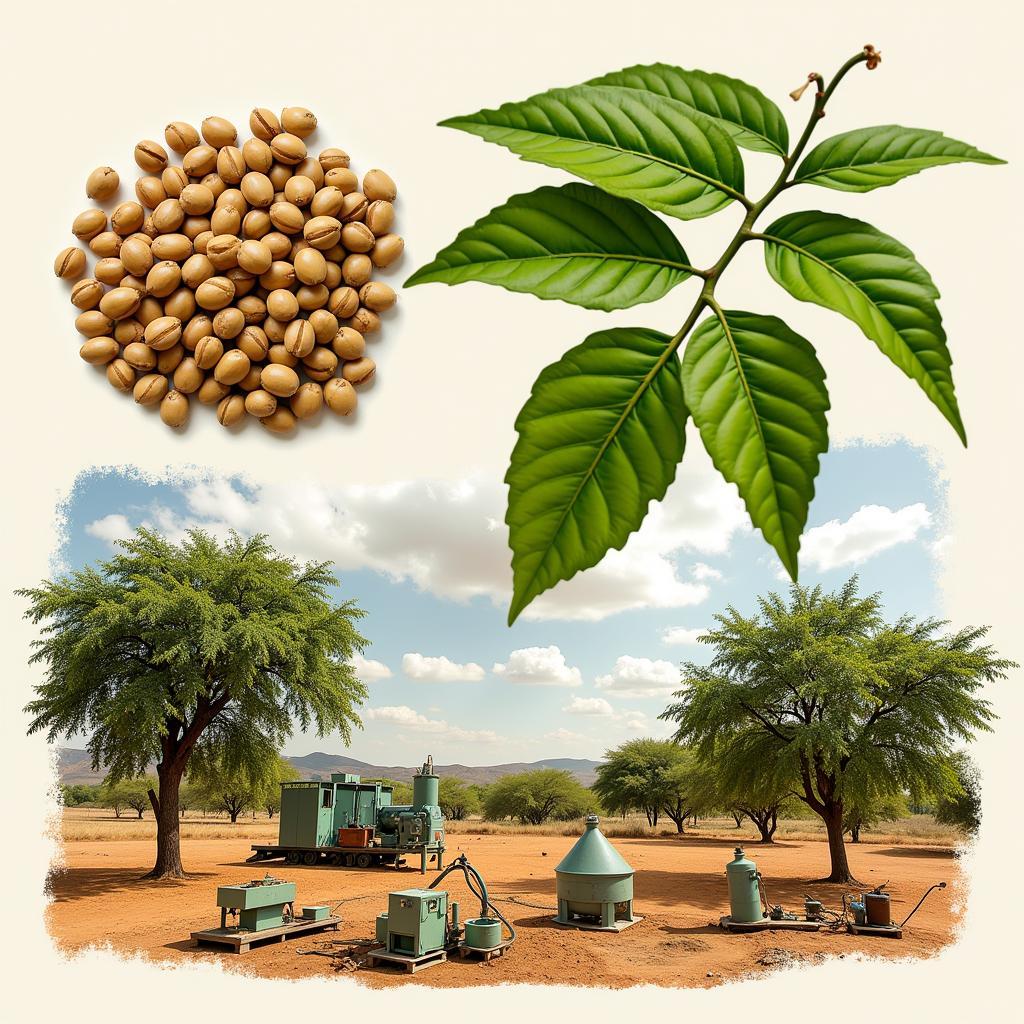Unveiling the Potential of African Jatropha
African jatropha, a drought-resistant plant native to Africa, is increasingly recognized for its diverse potential. From biofuel production to medicinal uses and soil erosion control, this versatile plant offers a wealth of benefits for various sectors across the continent and beyond. This article delves into the numerous applications of African jatropha, exploring its impact on local communities and the environment.
Exploring the Versatile Uses of African Jatropha
Jatropha, specifically Jatropha curcas, is making waves across multiple industries. Its resilience in arid and semi-arid regions makes it a particularly valuable resource in Africa. Let’s delve deeper into some of its key applications.
African Jatropha: A Promising Biofuel Source
One of the most prominent uses of African jatropha is in biofuel production. The seeds of the plant contain a high oil content, which can be converted into biodiesel. This offers a renewable and sustainable alternative to fossil fuels, potentially reducing reliance on imported petroleum and contributing to energy security.
 African Jatropha Biofuel Production
African Jatropha Biofuel Production
The use of jatropha for biofuel also has positive socio-economic implications. Cultivating jatropha can create employment opportunities in rural areas, boosting local economies and potentially improving livelihoods. Moreover, its ability to grow on marginal lands reduces competition with food crops for arable land.
Jatropha’s Role in Traditional Medicine and Pest Control
Beyond biofuel, African jatropha has a long history of use in traditional medicine. Various parts of the plant, including the leaves, roots, and seeds, are utilized for treating a range of ailments, from skin infections to digestive problems.
Furthermore, jatropha extracts are employed as a natural pesticide, protecting crops from insect damage and reducing the need for synthetic pesticides, contributing to more sustainable agricultural practices. This eco-friendly pest control method offers a valuable tool for farmers seeking to minimize their environmental impact.
Addressing the Challenges and Opportunities of African Jatropha Cultivation
While the potential of African jatropha is vast, its widespread adoption faces certain challenges. The yield of jatropha seeds can be variable, depending on factors such as climate and soil conditions. Research is ongoing to develop improved varieties with higher and more consistent yields.
Sustainable Jatropha Cultivation for a Greener Future
Sustainable cultivation practices are crucial for maximizing the benefits of African jatropha. Implementing responsible land management techniques, such as crop rotation and intercropping, can prevent soil degradation and enhance overall environmental sustainability.
“Jatropha presents a unique opportunity for Africa to embrace a sustainable future,” says Dr. Aminata Diallo, a renowned botanist specializing in African flora. “By investing in research and development, and promoting responsible cultivation practices, we can unlock the full potential of this remarkable plant.”
The Future of African Jatropha: A Catalyst for Sustainable Development
African jatropha holds immense promise as a driver of sustainable development. Its diverse applications, from biofuel and medicine to pest control and soil erosion prevention, have the potential to transform communities and contribute to a more sustainable future for the continent.
“The versatility of jatropha is truly remarkable,” adds Professor Joseph Okeke, an agricultural economist focusing on sustainable development in Africa. “Its ability to address multiple challenges simultaneously makes it a valuable asset in the pursuit of economic growth and environmental protection.” Further research and development, along with strategic investments, will be key to maximizing the potential of African jatropha and realizing its transformative impact on the lives of people across Africa.
Conclusion
African jatropha stands out as a versatile plant with significant potential for various applications. Its role in biofuel production, traditional medicine, and pest control highlights its multifaceted value. While challenges remain, ongoing research and sustainable cultivation practices are paving the way for a brighter future, leveraging the potential of African jatropha for economic growth and environmental sustainability.
FAQ
- What are the main uses of African jatropha?
- How does jatropha contribute to sustainable development?
- What are the challenges associated with jatropha cultivation?
- How can jatropha benefit local communities?
- What is the potential of jatropha as a biofuel source?
- What are the traditional medicinal uses of jatropha?
- How can jatropha be used for pest control?
Scenarios where questions about African Jatropha arise:
- Farmers: Considering using jatropha as a biofuel crop or for pest control.
- Investors: Exploring opportunities in the jatropha biofuel industry.
- Researchers: Investigating the medicinal properties of jatropha.
- Policymakers: Developing policies to promote sustainable jatropha cultivation.
- Environmentalists: Assessing the environmental impact of jatropha cultivation.
Further Reading
- Jatropha Biofuel Production: A Comprehensive Guide
- The Medicinal Properties of African Plants
- Sustainable Agriculture in Arid and Semi-Arid Regions
Need support? Contact us 24/7: Phone: +255768904061, Email: [email protected] or visit us at Mbarali DC Mawindi, Kangaga, Tanzania.

